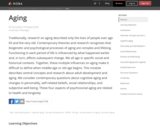
Text and links to all ancillary materials for Module 28
- Subject:
- Psychology
- Social and Behavioral Sciences
- Material Type:
- Module
- Reading
- Teaching/Learning Strategy
- Author:
- Jacqui Smith
- Tara Queen
- Date Added:
- 05/31/2021

Text and links to all ancillary materials for Module 28

Anatomy and Physiology is a dynamic textbook for the two-semester human anatomy and physiology course for life science and allied health majors. The book is organized by body system and covers standard scope and sequence requirements. Its lucid text, strategically constructed art, career features, and links to external learning tools address the critical teaching and learning challenges in the course. The web-based version of Anatomy and Physiology also features links to surgical videos, histology, and interactive diagrams.
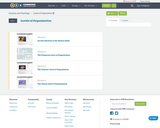
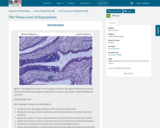

This OER resource offers an example of one required assignment for the Community Navigation with Older Adults course to help students build skills and knowledge locating resources for older adults in the community. Using a link to the National Council on Aging's web-based benefits locator, this assignment requires students to locate community resources for a sample older adult by the name of Mona. A case study of Mona is provided and students are required to assess her needs in the community, and in her home, and find appropriate resources for her needs with the benfits locator link.This particular assignment is part of a larger module of the Community Navigation with Older Adults course. This module focuses on the importance of community resources to a student engaging in community navigation with an older adult. This assignment requires students to record and respond (using either video or audio) their assessment of Mona's needs and the resources located for those needs in the community using the benefits locator link. Voicethread technology is the tool used in this course for this assignment, but instructors can feel free to create other forms to capture the students' assessment and their subsequent community resources for Mona.
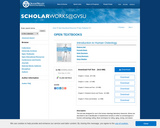
This text was designed for use in the human osteology laboratory classroom. Bones are described to aid in identification of skeletonized remains in either an archaeological or forensic anthropology setting. Basic techniques for siding, aging, sexing, and stature estimation are described. Both images of bone and drawings are included which may be used for study purposes outside of the classroom. The text represents work that has been developed over more than 30 years by its various authors and is meant to present students with the basic analytical tools for the study of human osteology.
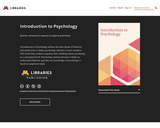
When you teach Introduction to Psychology, do you find it difficult — much harder than teaching classes in statistics or research methods? Do you easily give a lecture on the sympathetic nervous system, a lecture on Piaget, and a lecture on social cognition, but struggle with linking these topics together for the student? Do you feel like you are presenting a laundry list of research findings rather than an integrated set of principles and knowledge? Have you wondered how to ensure your course is relevant to your students? Introduction to Psychology utilizes the dual theme of behavior and empiricism to make psychology relevant to intro students. The author wrote this book to help students organize their thinking about psychology at a conceptual level. Five or ten years from now, he does not expect his students to remember the details of most of what he teaches them. However, he does hope that they will remember that psychology matters because it helps us understand behavior and that our knowledge of psychology is based on empirical study.
This is a derivative of INTRODUCTION TO PSYCHOLOGY by a publisher who has requested that they and the original author not receive attribution, which was originally released and is used under CC BY-NC-SA. This work, unless otherwise expressly stated, is licensed under a Creative Commons Attribution-NonCommercial-ShareAlike 4.0 International License.

Introduction to Sociology 2e adheres to the scope and sequence of a typical, one-semester introductory sociology course. It offers comprehensive coverage of core concepts, foundational scholars, and emerging theories, which are supported by a wealth of engaging learning materials. The textbook presents detailed section reviews with rich questions, discussions that help students apply their knowledge, and features that draw learners into the discipline in meaningful ways. The second edition retains the book’s conceptual organization, aligning to most courses, and has been significantly updated to reflect the latest research and provide examples most relevant to today’s students. In order to help instructors transition to the revised version, the 2e changes are described within the preface.

Growth and development through the life span including physical, social, cognitive and neurological development. Topics covered included daycare, education, disabilities, parenting, types of families, gender identity and roles, career decisions, illnesses and treatments, aging, retirement, generativity, and dying.Login: guest_oclPassword: ocl
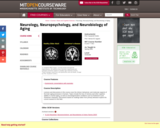
Lectures and discussions explore the clinical, behavioral, and molecular aspects of brain aging processes in humans. Topics include: loss of memory and other cognitive abilitites in normal aging; neurodegenerative conditions such as Parkinson's and Alzheimer's diseases. Based on lectures, readings taken from the primary literature, and discussions. Students are expected to present topics based on their readings. One written mid-term test and one final examination. Alternate years.
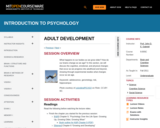
What happens to our bodies as we grow older? How do our brains change as we age? In this section, we will discuss the cognitive, emotional, and physical changes that occur as we progress into adulthood and beyond, showing through experimental studies what changes occur as we age.
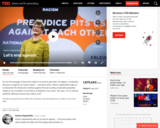
It's not the passage of time that makes it so hard to get older. It's ageism, a prejudice that pits us against our future selves — and each other. Ashton Applewhite urges us to dismantle the dread and mobilize against the last socially acceptable prejudice. "Aging is not a problem to be fixed or a disease to be cured," she says. "It is a natural, powerful, lifelong process that unites us all." Duration: 11:07.
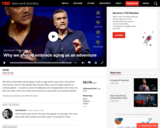
We need to feel better about aging in order to age better, says writer and activist Carl Honoré. How? In this spirited talk, Honoré offers a set of simple solutions to combat ageism — as well as a host of trailblazers and changemakers who came into their own later in life, from artists and musicians to physicists and business leaders. Duration: 12:34.
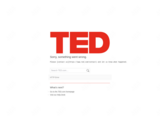
For the first time ever, we have five generations in the workplace at the same time, says entrepreneur Chip Conley. What would happen if we got intentional about how we all work together? In this accessible talk, Conley shows how age diversity makes companies stronger and calls for different generations to mentor each other at work, with wisdom flowing from old to young and young to old alike. Duration: 12:13.
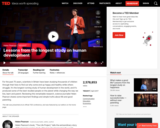
For the past 70 years, scientists in Britain have been studying thousands of children through their lives to find out why some end up happy and healthy while others struggle. It's the longest-running study of human development in the world, and it's produced some of the best-studied people on the planet while changing the way we live, learn and parent. Reviewing this remarkable research, science journalist Helen Pearson shares some important findings and simple truths about life and good parenting. Duration: 12:17.
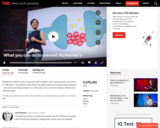
Alzheimer's doesn't have to be your brain's destiny, says neuroscientist and author of "Still Alice," Lisa Genova. She shares the latest science investigating the disease — and some promising research on what each of us can do to build an Alzheimer's-resistant brain. Duration: 13:47.
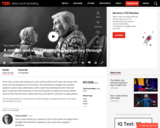
Artist Tony Luciani was testing out a new camera when his 91-year-old mother, Elia, snuck into the background of his photos. The spontaneous images that resulted sparked a years-long collaboration, with Luciani documenting his mom's life and spirit as she lived with dementia. In this touching talk, he shares the stories behind some of their favorite shots, capturing the joy and grief of caring for an aging parent. Duration: 13:23.